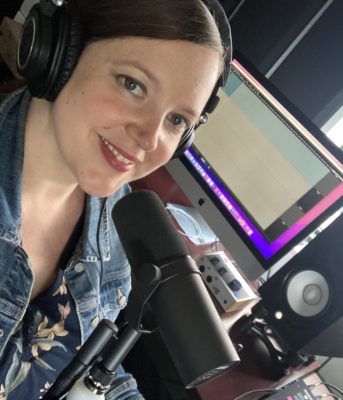SUMMARY
In this first episode of Season 4, SpokenWeb’s ShortCuts continues the tradition of starting a new season by diving into its own archives. What kinds of new stories and audio criticism can be produced through short archival clips? Join host and producer Katherine McLeod to listen to clips from Season 3 of ShortCuts as a way of asking what literary criticism sounds like through cutting and splicing sound. It is a short exercise in archival listening, and archival making.
EPISODE NOTES
A fresh take on sounds from the past, ShortCuts is a monthly feature on The SpokenWeb Podcast feed and an extension of the ShortCuts blog posts on SPOKENWEBLOG. Stay tuned for monthly episodes of ShortCuts on alternate fortnights (that’s every second week) following the monthly SpokenWeb podcast episode. If you are a SpokenWeb RA with an archival clip to feature on ShortCuts, do write to us at spokenwebpodcast@gmail.com with your pitch.
Host and Series Producer: Katherine McLeod
Supervising Producer: Kate Moffatt
Audio Engineer / Sound Designer: Miranda Eastwood
Production Manager and Transcriber: Kelly Cubbon
ARCHIVAL AUDIO
Check the transcript for the timestamps for where this audio appears in the episode and for a map for all of the sounds. Here is a list with links for finding out more about these archival recordings.
Katherine McLeod, from ShortCuts 3.1 “Sounds”: https://spokenweb.ca/podcast/episodes/sounds/
Katherine McLeod, from ShortCuts 3.9 “Re-Situating Sound”: https://spokenweb.ca/podcast/episodes/re-situating-sound/
Archival audio, Dionne Brand, 1988 reading, from ShortCuts 3.3 “Communal Memories”: https://spokenweb.ca/podcast/episodes/communal-memories/
Archival audio: Douglas Barbour, from Penny Chalmers (Penn Kemp) at the University of Alberta, February 18, 1977; Douglas Barbour introducing Penny Chalmers (Penn Kemp) at the University of Alberta, February 18, 1977; Douglas Barbour introducing Leona Gom at the University of Alberta, February 21, 1980; Douglas Barbour, from John Newlove at the University of Alberta, March 19, 1981 — all from ShortCuts 3.6 “Listening Communities: The Introductions of Doug Barbour” (guest produced by Michael O’Driscoll): https://spokenweb.ca/podcast/episodes/listening-communities-the-introductions-of-douglas-barbour/
Archival audio, Daphne Marlatt, 1970, from ShortCuts 3.4 “Sonic Passages”: https://spokenweb.ca/podcast/episodes/sonic-passages/
Daphne Marlatt interview with Karis Shearer and Megan Butchart played on “SoundBox Signals presents Performing the Archive” an episode of SoundBox Signals that was aired on The SpokenWeb Podcast (co-produced by Karis Shearer, Megan Butchart, and Nour Sallam), clipped on ShortCuts 3.4: https://spokenweb.ca/podcast/episodes/sonic-passages/
Interview with Kelly Cubbon, “Talking Transcription: Accessibility, Collaboration, Creativity,” (co-produced by Kelly Cubbon and Katherine McLeod), S3E9 The SpokenWeb Podcast, June 2022: https://spokenweb.ca/podcast/episodes/talking-transcription-accessibility-collaboration-and-creativity/
Interview with Kaie Kellough, ShortCuts 3.5 “The Voice that is the Poem”: https://spokenweb.ca/podcast/episodes/the-voice-that-is-the-poem-ft-kaie-kellough/
Archival audio, Oana Avasilichioaei, from ShortCuts 3.8: https://spokenweb.ca/podcast/episodes/the-event/
Archival audio, bpNichol, November 1968, from ShortCuts 3.2: “What the Archive Remembers”: https://spokenweb.ca/podcast/episodes/what-the-archive-remembers/
Archival audio, Phyllis Webb, from ShortCuts 3.7 “Moving, Still”: https://spokenweb.ca/podcast/episodes/moving-still/
*Interim Transcript – Official Transcript Coming Soon*
[Music: Piano Overlaid With Distorted Beat] ]
Katherine McLeod: Welcome to ShortCuts. My name is Katherine McLeod. Join me, each month on alternate fortnights (that’s every second week following the monthly SpokenWeb Podcast episode) for SpokenWeb’s ShortCuts. Short stories about how literature sounds.
[End Music: Piano Overlaid With Distorted Beat]
On ShortCuts, we explore what you can make by cutting up [scissor cut] and splicing sound digitally. What kinds of new stories and audio criticism can be produced through these short archival clips? If you’re a researcher with the SpokenWeb Project, do think about joining me on ShortCuts to discuss an archival clip that has impacted your work, especially if you’re a student who has been digitizing and cataloguing recordings and there’s a sound that stands out to you after all those hours of listening. Get in touch! Write to SpokenWebPodcast@gmail.com
Now, as I’ve always done to start each season, let’s dive into the archives of ShortCuts. We’ll listen to clips from the previous season, Season 3, in order to hear what ShortCuts sounds like… We’ll do this as is an exercise in listening – an exercise in archival listening. From now on…
Katherine McLeod, from ShortCuts 3.1: All of the sounds will be clips from Season Three of ShortCuts, and that includes my voiceover. [Overlapping] My Voiceover, my voiceover.
Katherine McLeod, from ShortCuts 3.9: And I say that while holding out my arms gesturing as though I’m attempting to hold the sound.
[Tape rewinding]
Katherine McLeod, from ShortCuts 3.9: I am holding the sound carefully, knowing how difficult it can be to take a recorded voice, with all of its situated affect attached to it, out of the archives. To unarchive carefully.
[Tape rewinding ends]
Archival audio, Dionne Brand, 1988 Reading, from ShortCuts 3.3: Lee read the epigram back to me in Montreal. And I was very honoured too, that she had written it back to me and I’ve been trying to write her back an epigram. We might make a book [Audience Laughter]. So I haven’t got very far with the epigram except to say: “Write me out of this epigram, Lee, you are so much water. You are too much water, too much rock, so much eagle. Write me out of this epigram, Lee. I am so much bush, so much ocean, so much rage…” And that’s just the beginning. [Laughter] It’s not finished. [Clapping] It’s supposed to go and like “write us out of this goddamn epigram.” [Audience Laughter]. I want to read a couple poems about South Africa.
Katherine McLeod, from ShortCuts 3.3: Brand starts her reading after Maracle with a poem for South Africa. And that is exactly how Maracle had started hers. I am taking all of these audio clips out of their contexts, out of their linear order in which they would’ve been heard in the reading, but, in doing so, I’m trying to bring to the forefront, the connections that are embedded within it and the conversation happening between poets in the reading itself.
Archival Audio, Douglas Barbour, from Penny Chalmers (Penn Kemp) at the University of Alberta, February 18, 1977, from ShortCuts 3.6: They’ll be right up to your feet but that won’t be too bad.
Archival Audio, Douglas Barbour introducing Penny Chalmers (Penn Kemp) at the University of Alberta, February 18, 1977, from ShortCuts 3.6: …Penny is the author of Most Recently Transformed, which is a marvelous looking book, as well as a very, very fine book…
Archival Audio, Douglas Barbour introducing Leona Gom at the University of Alberta, February 21, 1980, from ShortCuts 3.6: [Audience Chatter] …still a bit of… Not much [Audience Laughter]. We’re happy to welcome Leona Gom. [Audience Applause]
Archival Audio, Douglas Barbour, from John Newlove at the University of Alberta, March 19, 1981, from ShortCuts 3.6: [Audience Chatter] …there’s your friend. There’s a little bit of room if you wanna sit on the floor here!
Audio recording, Daphne Marlatt, 1970, from ShortCuts 3.4: This is a poem that I wrote when I was about… oh I don’t know, seven or eight months pregnant… [Pause] …Bird of Passage. I wrote it in Vancouver… spring time again…. Bird of Passage.
Katherine McLeod, from ShortCuts 3.4: Here, was Marlatt in 1970 saying that she had written this poem ‘Bird of Passage’ while she was pregnant. That is significant in and of itself when thinking of the body but now I was hearing it with the full resonance of her recent conversation with Shearer and Buchart from the podcast and what Marlatt says when the date of the recording, July 1969, is mentioned…
Archival audio played on “SoundBox Signals presents Performing the Archive”, 2019, from ShortCuts 3.4: Interesting that date, because I had given birth to my son at the beginning of May. So, I was a young mother, my body had gone through a major experience. That was not the experience that I’d had when I wrote those poems. What was interesting to me hearing last night at the reading – there was so much – my voice was so much more present in those poems than I had remembered my voice being…
Kelly Cubbon, S3E9, SpokenWeb Podcast: […] I think also overlapping context for lack of a better word has been something I’ve I think we’ve been working to indicate such as if someone appears in an episode in a Zoom interview and then in an archival recording of them, and that archival recording includes them speaking to the audience as an aside and then performing poetry. And then maybe they’re in kind of a more formal voiceover audio. There might be four instances of slightly different context to indicate.
Zoom interview with Kaie Kellough, from ShortCuts 3.5: : You asked me [Start Music: ShortCuts Theme Music] what it was like, what I thought about when hearing it and it’s strange to hear that kind of reflection of yourself and to – I didn’t realize it was as far back as 2016, because it feels a lot sooner. I remember what I was thinking about. I remember what my poetry, my poetic preoccupations were at the time. I remember how far that poem came because it was young and sentimental when I wrote it, and then it was not like that by the time it was published. It took on a different sort of personality by the time it was published. But yeah, I remember everything that I was thinking about. I remember how excited I was about it. Yeah. It’s just a — so thank you.
Zoom interview, Katherine McLeod, from ShortCuts 3.5: Thank you so much.
Archival audio, Oana Avasilichioaei, from ShortCuts 3.8: [Performing “Chambersonic”] Let form be oral / a foundation / sonority / an impossible lone sound / recording / the ghost of sound [whispered] the ghost of sound. Let form be oral. A foundation of phonemes. Distorted – [overlapping voice] fragments. Re-assemblages. [Whispered] The ghost of sound…
Katherine McLeod, from ShortCuts 3.8: This. This is a setting on music. This is. What is this? It is as though she is asking us to consider: what is this this-ness of sonority? Of an impossible lone sound? Of the ghost of sound?
Archival Audio, bpNichol, November 1968, from ShortCuts 3.2: [Reading poem] Wanting you, I forgot you. You erased my name. Erasing you, the wanting forgot, I tried your name.
Katherine McLeod, from ShortCuts 3.2: The emotional weight of archives.
Archival audio, Phyllis Webb, from ShortCuts 3.7: [Reading from “Naked Poems”] In the gold darkening light / you dressed / I hid my face in my hair. / The room that held you is still here. / You brought me clarity / gift after gift I wear / poems / naked, in the sunlight / on the floor [sound of pages turning]…
Katherine McLeod, from ShortCuts 3.2: To what extent are we trying, trying to remember or trying to erase a memory that may not be ours in the first place –
Archival Audio, bpNichol, November 1968, from ShortCuts 3.2: [Reading a poem] I wanted to forget you, so I tried to erase your name.
Katherine McLeod, from ShortCuts 3.2: — and yet having heard it, that memory can never be forgotten. The feeling of having heard it is still there.
[Ambient music begins]
Katherine McLeod, from ShortCuts 3.9: You’ve been listening to ShortCuts. ShortCuts is transcribed by Kelly Cubbon, mixed and mastered by Miranda Eastwood, and written and produced by me, Katherine McLeod. Thanks for listening.
[End of music]

